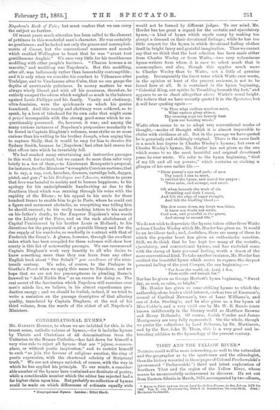CONGREGATIONAL HYMN - S.*
Ma. GARRETT BORDER, to whom we are indebted for this, in the truest sense, catholic volume of hymns,—for it includes hymns by Theists and Christians of all denominations from the Unitarian to the Roman Catholic,—has laid down for himself a very wise rule to reject all hymns that are " jejune, commonplace, or without poetic inspiration," and to restrict himself to such " as join the fervour of religious emotion, the ring of poetic expression, with the chastened sobriety of Scriptural truth." We are not always satisfied, of course, with the way in which he has applied his principle. To our minds, a considerable number of the hymns here contained are destitute of poetry, while a considerable number which the editor has rejected had a far higher claim upon him. But probably no collection of hymns could be made on which differences of estimate equally wide would not be formed by different judges. To our mind, Mr.
Hordes has too great a regard for the ecstatic and ejaculatory hymn,—a kind of hymn which repels many by making too abrupt a demand on their devotional feelings ; while he has too little respect for the hymn in which devotional feeling clothes.
itself in bright fancy and grateful imagination. Thus we cannot say that we think that the best selection has been made either from Charles Wesley or from Watts,—two very voluminous hymn-writers from whom it is easy to select much that is commonplace, and also, though this applies much more to Charles Wesley than to Watts, not a little of genuinepoetry. Incomparably the finest verse which Watts ever wrote,.
in the opinion at least of the present reviewer, is not to befound here at all. It is contained in the hymn beginning, " Celestial King, our spirits lie Trembling beneath thy feet," and appears to us to shoot altogether above Watts's usual height..
We believe that we have recently quoted it in the Spectator, but it will bear quoting again :—
" In Thee what endless wonders meet, What various glory shines,
The crossing rays too fiercely beat Upon our fainting minds."
Watts often seems to us to adopt very conventional modes of thought,—modes of thought which it is almost impossible to clothe with vividness at all. But in the passage we have quoted he is genuinely and strikingly original. There is the same fault in a much less degree in Charles 'Wesley's hymns ; but even of Charles Wesley's hymns, Mr. Hordes has not given us the one which seems to us the most beautiful and original devotional poem he ever wrote. We refer to the hymn beginning, " God of my life and all my powers," which contains so striking a glimpse of his own earlier life :—
"From parent's eye and paths of men Thy touch I ran to meet,
It swelled the hymn, and sealed the prayer : 'Twas calm, and strange, and sweet.
Oft when beneath the work of sin Trembling and dark I stood, And felt the edge of eager thought, And felt the kindling blood ; The dew came down, my heart was thine, It knew nor doubt nor strife,
Cool now, and peaceful ns t be grave, And strong to second life."
We do not wish to depreciate the hymns taken either from Watts or from Charles Wesley which Mr. Hordes has given us. It would be an invidious task ; and, doubtless, there are many of them to which the popular heart has given an enthusiastic sanction. Still, we do think that he has kept too many of the ecstatic,.
ejaculatory, and conventional hymns, and has excluded somewith the stamp of keen personal feeling, worth a dozen of the more conventional kind. To take another instance, Mr. Hordes has. omitted the beautiful hymn which seems to express the deepest personal feeling of the poet Cowper, the one beginning :
" Far from the work', oh, Lord, I flee, From strife and tumult far."
Nor has he given us George Herbert's hymn beginning, " Sweet day, so cool, so calm, so bright."
Mr. Hordes has given us some striking hymns to which the authorship alone lends a vivid interest, such as two of Emerson's,
several of Cardinal Newman's, two of Isaac Williams's, and oue of John Sterling's ; and he also gives us a fine hymn of Miss Cobbe's, and a very vivid oue by Mr. W. B. Rands (once known indifferently in the literary world as Matthew Browne and Henry Holbeach). Of course, Josiah Conder and James. Montgomery are very fully represented. On the whole, though we prefer the collections by Lord Selborne, by Dr. Martineau, and by the Rev. John H. Thom, this is a very good and interesting addition to the hymnology of the present century.


































 Previous page
Previous page